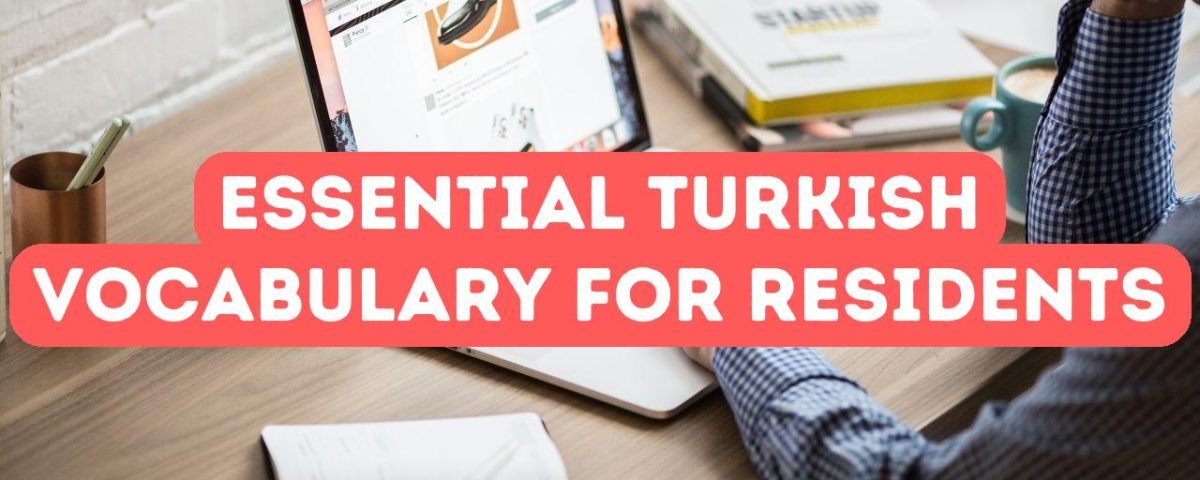Essential Turkish Vocabulary for Residents
Embarking on a journey to reside in the vibrant and culturally rich landscapes of Turkey, one must grasp the linguistic threads that weave the fabric of daily life within its historic bounds. To truly integrate and navigate the social tapestry of this Eurasian gem, acquiring a fundamental understanding of the Turkish language is paramount. In the art of communication and the utility of language lies the power to unlock the heart of Turkish society, to foster connections with its warm inhabitants, and to navigate the intricacies of its markets, streets, and institutions. This guide to essential Turkish vocabulary is tailored for new residents aiming to ease their transition into their new environment. It is meticulously curated to provide a robust foundation of commonly used words and phrases, enabling meaningful interactions and holistic comprehension of the world around them, thus bridging the cultural divide and enriching their experience in Turkey.
Navigating Daily Life: Key Phrases and Words
In the bustling Turkish cities or tranquil Anatolian villages, navigating daily life begins with simple yet powerful greetings and pleasantries. ‘Merhaba’ (Hello) is your universal key to countless interactions; pair it with ‘Nasılsınız?’ (How are you?) to show genuine interest in your counterpart’s well-being. Daily exchanges often include the polite ‘Teşekkür ederim’ (Thank you) and ‘Lütfen’ (Please), laying the foundation for respectful communication. Knowledge of directional phrases like ‘Sağa dön’ (Turn right), ‘Sola dön’ (Turn left), and ‘Düz git’ (Go straight) equips you to navigate the maze of Turkish streets. Furthermore, mastering numbers will aid in shopping and bargaining, an integral aspect of the Turkish market experience. Familiarize yourself with ‘Bir’, ‘İki’, ‘Üç’ for basic transactions and gradually build your numerical lexicon for more complex interactions.
Beyond the marketplace, engaging with local cuisine is a delightful and essential aspect of Turkish culture. Equip yourself with phrases such as ‘Menü lütfen’ (Menu please) and ‘Hesap lütfen’ (Check please) when dining out. To express dietary preferences or restrictions, phrases like ‘Vejetaryenim’ (I am vegetarian) or ‘Alerjim var’ (I have an allergy) are crucial. When savoring the vast array of Turkish dishes, a compliment to the chef with ‘Elinize sağlık’ (Health to your hands) is a respectful nod to their culinary skills. In residential matters, understanding terms for household utilities like ‘Su’ (Water), ‘Elektrik’ (Electricity), and ‘Doğalgaz’ (Natural Gas) becomes important, especially when dealing with maintenance or bills. The same applies to basic banking vocabulary, with words such as ‘Hesap’ (Account) and ‘Para çekmek’ (To withdraw money) forming the basis of financial interactions.
In the realm of social engagement, fostering relationships with neighbors and locals is made smoother with conversational connectors such as ‘Tabii ki’ (Of course), ‘Anladım’ (I understand), and ‘Affedersiniz’ (Excuse me/Pardon). When faced with the inevitable language barrier, ‘Türkçe bilmiyorum’ (I don’t speak Turkish) and ‘İngilizce konuşuyor musunuz?’ (Do you speak English?) prove indispensable. For those with families, terms related to education, such as ‘Okul’ (School), ‘Öğretmen’ (Teacher), and ‘Ödev’ (Homework), become part of the daily vocabulary. Engaging in the community might require familiarity with ‘Etkinlik’ (Activity), ‘Spor Salonu’ (Gym), and ‘Kütüphane’ (Library). Equipped with these words and the willingness to immerse oneself in the local language, new residents can navigate the nuances of daily interactions, thereby weaving their own thread into the vibrant fabric of Turkish life.
Professional and Social Interactions: Advanced Language Skills
Delving into the realm of professional and social interactions in Turkey without a command of the language can feel like navigating a labyrinth without a map. As you find yourself in diverse settings, from formal business meetings to casual gatherings, the importance of advanced Turkish vocabulary becomes abundantly clear. Mastering phrases such as iş görüşmesi (business meeting), proje sunumu (project presentation), and network kurmak (to network) will not only demonstrate your commitment to professional integration but also facilitate your participation in sophisticated discussions. Similarly, social fluency is enriched by knowing expressions like hoş sohbet (pleasant conversation), kültürel etkinlik (cultural event), and dinlenmek için müzik (music for relaxation), enabling you to engage authentically and with ease in the country’s dynamic social scene.
Building on foundational language proficiency, one must also become adept in the nuanced subtleties that color Turkish communication. This includes understanding idiomatic expressions and proverbs, which often pepper everyday conversation and can be a telling sign of language mastery. Phrases like “el üstünde tutmak” (to hold in high regard), “gözünü dört aç” (be vigilant, literally ‘open your eyes wide’), and “kulakların çınlasın” (may your ears burn, used when someone is talked about in their absence) are invaluable in social circles and can inspire smiles of appreciation from native speakers. Using such colloquialisms appropriately can significantly deepen your connections, indicating a respectful embrace of Turkey’s linguistic heritage, and conveying your willingness to go beyond transactional language to truly understand the spirit of Turkish camaraderie.
To elevate your linguistic prowess to the level of a seasoned expat, indulge in the practice of Turkish honorifics and formalities as they reflect the culture’s intrinsic value of respect and politeness. Adapting terms like Sayın (Mr./Ms. when addressing someone with respect) before surnames, and using abi (older brother) or abla (older sister) as affectionate terms for peers, can significantly enhance the warmth of your interactions. Moreover, mastering the art of giving and receiving compliments, such as Elinize sağlık (may your hands be healthy, said in praise of someone’s cooking or work) and Ne güzel düşünmüşsünüz! (how nicely you’ve thought this through!), can lead to more intimate professional and social relationships. Truly, a sensitive and mindful use of elaborate Turkish courtesies forms the cornerstone of establishing profound rapport and is essential for anyone committed to making Turkey their new home.
Mastering Local Culture: Essential Idioms and Expressions
Diving into the heart of Turkish culture necessitates more than just learning basic vocabulary; it requires immersing oneself in the colorful idioms and expressions that are the lifeblood of everyday conversation. To speak like a local is to pepper your language with phrases such as “Ellerin dert görmesin” (May your hands not come to harm), a way to thank someone for their work, or “Kulağa küpe olmak” (Let it be an earring to your ear), a reminder to heed advice given. Familiarity with such expressions will not only endear you to native speakers but also reflect a deeper appreciation of their traditions and ways of thinking. By wrapping your tongue around these linguistic gems, you solidify your place within the community, moving from an outsider to someone who understands the heartbeat of Turkish society.
Expressions like “Bir taşla iki kuş vurmak” (To hit two birds with one stone) beautifully illustrate the efficiency that is often admired in Turkish culture, while saying “Gözlerinden öperim” (I kiss your eyes) conveys deep respect and affection towards the person you are speaking with. These phrases contain the emotional weight and history of a society that values wit, respect, and relational bonds. As you navigate the bustling bazaars and the quiet tea gardens, tossing a well-timed “Geçmiş olsun” (May it be past) to someone who has faced misfortune, or responding with a heartfelt “Teşekkür ederim” (Thank you) to an act of kindness, shows an engagement with the culture that goes beyond transactional interactions. By mastering these idioms and expressions, you become an active participant in the ongoing story of Turkish life, weaving your own experiences into the rich tapestry that is this nation’s heritage.
Beyond the realm of courteous exchanges and witty repartee, some Turkish expressions serve as a key to unlocking the collective mindset and ethos of its people. Phrases like “Sabır taşı” (Patience stone) reveal the high value Turks place on patience and perseverance, while “Ağzından bal damlıyor” (Honey drips from your mouth) expresses admiration for someone’s sweet and persuasive speech. Engaging with these idioms not only facilitates a deeper connection with individuals but also embeds you within the broader cultural narratives that Turks hold dear. As you absorb and use these expressions, you affirm your willingness to embrace the Turkish way of life, charting a course from being a mere spectator to becoming a storyteller in Turkey’s grand, unfolding narrative, narrating your own chapters through shared language and sentiment.






